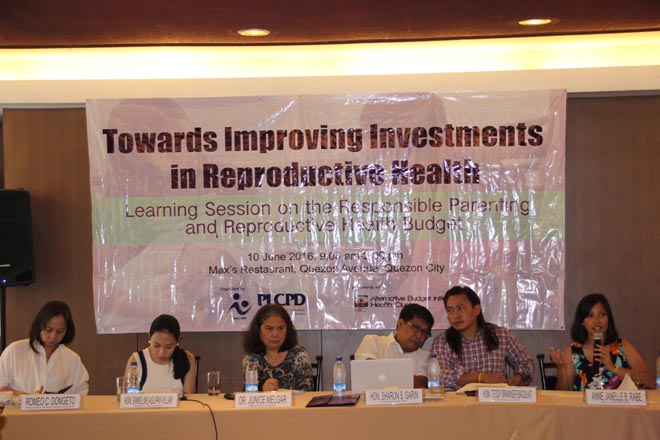PLCPD hosts learning session on 2017 budget for RPRH Law implementation
Various stakeholders from the legislative and executive branches, civil society, and faith-based organizations gathered last June 10 for “Improving Investments in Reproductive Health, A Learning Session on the Responsible Parenting and Reproductive Health Budget.” The Philippine Legislators’ Committee on Population and Development (PLCPD) organized the learning activity to inform stakeholders and exchange ideas on how to adequately monitor and defend the budget for the implementation of the Responsible Parenthood and Reproductive Health (RPRH) Law in the upcoming deliberations of the proposed 2017 General Appropriations Act.
Rep. Sharon Garin, PLCPD Vice Chair for Visayas, opened the event by reiterating that reproductive health is about giving equal opportunities and upholding the right to choose. For her, the battle for RH is far from over but she is hopeful for the new Congress as she strives to support and defend the RH law, especially on the budget.
Dr. Junice Melgar, the Director of the Family Health Office of the Department of Health, explained that due to excessive procurement in the previous years, not all family planning commodities are being absorbed and utilized by the communities through local government units (LGUs). This has resulted in lower budget allocations for family planning commodities since the existing stock is still sufficient until 2018. She emphasized that the issue of budget goes beyond the numbers on the spreadsheets but is in fact affected by challenges in service delivery and implementation.
Dr. Melgar also discussed some issues and challenges on the implementation of the RPRH, including the following: (a) utilization at the DOH National means the funds are already obligated/awarded but the actual utilization at the ground level is a different matter, and (b) estimation of needed commodities at the LGU level is inexact and consumption data are inadequate which leads to under or over procurement
Former DOH Sec. Esperanza Cabral, Chair of the National Implementation Team for RPRH Law, concurred that the ability to generate consumption data is very inadequate. Without these data, the government will not be able to utilize and plan the consumption needs of the people for the next budget cycle. Secretary Cabral suggested that there should be a monitoring instrument to obtain accurate, credible and timely data.
PLCPD Vice Chair for Luzon, Rep. Teddy Baguilat stressed that there is a need to capacitate legislators on how to navigate and monitor the budget process. He also shared his experiences as a local chief executive in Ifugao, observing the gap between the actual preferences and supplies provided for RH and family planning needs of women. Rep. Baguilat suggested that LGUs should take the initiative in creating their own ordinances to establish strong programs and funding for services on reproductive health.
In the open forum, PLCPD member, Rep. Emmeline Aglipay-Villar emphasized the need to improve the educational system especially for boys so they would gain sufficient knowledge on how to respect and support sexual and reproductive health rights (SRHR) of both men and women. Several suggestions also emerged from participants, including: strengthened cooperation between national agencies and LGUs in determining needs of constituents and avoiding wastage in supplies and commodities, need for the Department of Education to seriously implement the provision in RPRH Law for age-appropriate sexuality and RH education, as well as getting the Supreme Court to lift the temporary restraining order on public procurement and distribution of contraceptive implants, among others. For the participants, these are all issues that have implications not only on the budget but have real impact on the health and welfare of Filipinos.
Mr. Romeo Dongeto, PLCPD executive director, presented the profile of the 17th Congress and discussed the milestones, opportunities and challenges in the next several years. These include the crafting of the next mid-term national development plan and development of national Sustainable Development Goals indicators. He stressed that the one of the major takeaways from the activity was the need for improved collaboration among NGAs, LGUs, legislators, CSOs in proposing and supporting budget allocations responsive to the actual needs in implementation.
Reps. Baguilat and Aglipay-Villar closed the activity with their messages of gratitude to the RH community for their commitment in defending the RH law. They urged advocates to continue working with legislators so that together, they will continue vigilance in monitoring the full implementation of the RPRH law and the fulfilment of everyone’s sexual and reproductive health rights.

